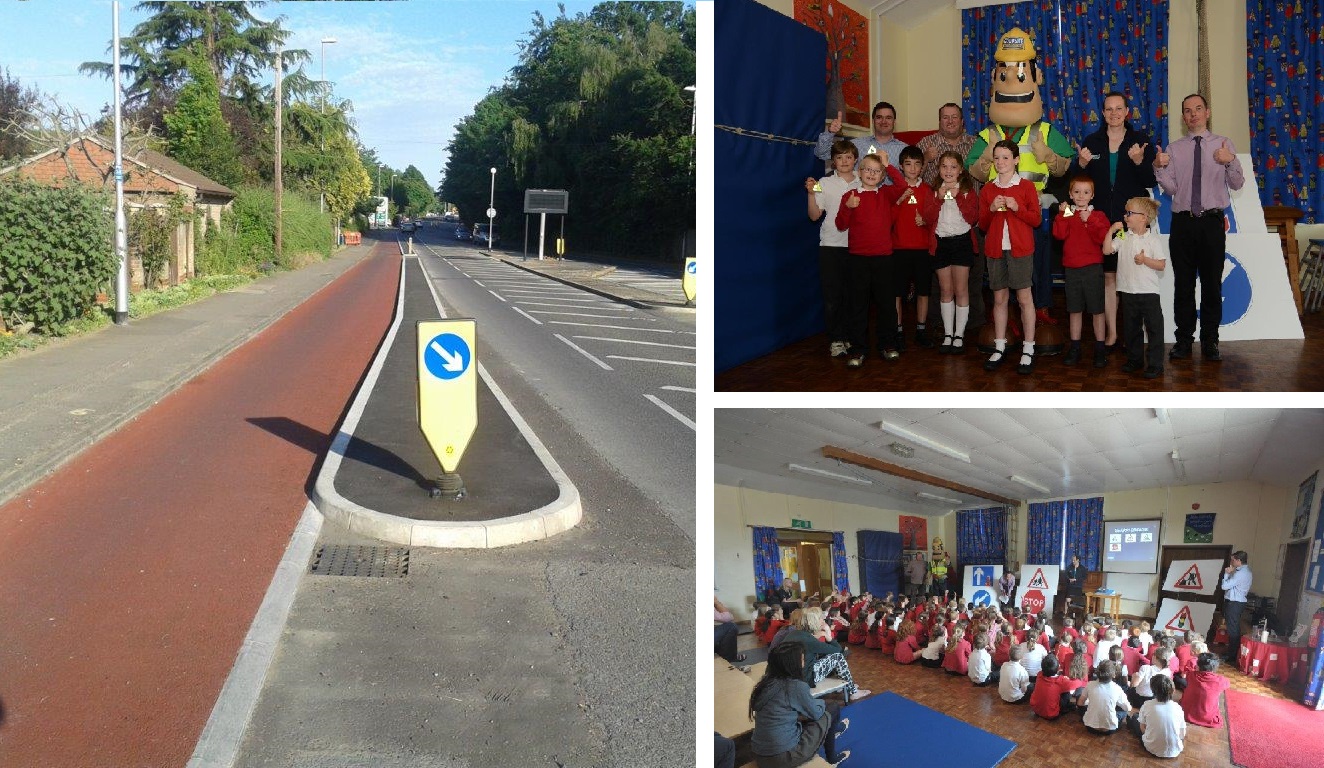Enhancing the image of highways construction – Skanska Infrastructure Services
Skanska Infrastructure Services’ project to widen, restructure, resurface and create a protected cycle lane along the busy Huntingdon Road, connecting to the City of Cambridge, was praised for its excellent practice by the Scheme.
Examples of community engagement included the site team visiting the local Oakington Primary School and giving a presentation on the importance of road safety around construction sites.
Accompanied by construction industry mascot, Ivor Goodsite, the team outlined their project and the roles of different types of construction machinery found on site. They then asked the children to identify potential hazards in a series of pictures.
Sandra Nichols, Skanska’s Public Liaison Officer said:
“It’s critically important that children have the knowledge and skills to stay safe around roadworks, particularly during the summer months when they are much more likely to be out and about. The children at Oakington were so much fun to be around. They were very inquisitive and really got involved in the session.”
Peter Nicholas, Skanska’s Scheme Delivery Manager said:
“Huntingdon Road is an arterial route into the historic City of Cambridge and the works taking place are highly visible. Therefore the appearance of the site and operatives should enhance the image of the highways construction industry. Ensuring steady progress of work while maintaining high standards of site cleanliness has been a specific challenge.
“All staff were encouraged to alter their behaviour by ensuring their Personal Protective Equipment (PPE) is suitable and sufficient for such a high profile location.
Established in 1887, Skanska is one of the world’s leading project development and construction groups and as one of the UK’s leading contractors, is an inclusive and responsible business that is helping to build a better society. Drawing on its Scandinavian heritage, Skanska is green, innovative and progressive.
Here are some examples of best practice initiatives carried out by Skanska:
- Well set up and maintained work areas and smart workforce gave a great impression to travellers along this one mile stretch of the A1307 busy commuter route into the city.
- Regular clean-up patrols were in place to remove any public rubbish around the highway and the compound. This minimised litter and graffiti.
- Site vehicles were all required to display client branding and operatives were required to wear six-point PPE.
- Discrete smoking areas were allocated on-site and inductions dealt with both site and personal cleanliness.
- A grab vehicle removed any spoils or waste at the end of each shift to allow the highway to return to normal routing.
- Close liaison with residents was initially achieved by a letter drop to all affected parties and stakeholders along the operational route.
- This was then maintained, more specifically by personal contact on a daily basis, as and when required.
- An unrestricted safe passage for pedestrians and cyclists was provided throughout the site and the local and national bus service was also maintained, with temporary bus stops provided where permanent stops had to be suspended.
- The project had the support of local media, including live radio traffic updates, which enabled traffic congestion to be minimised.
- Access to and from adjacent properties was made available at all times.
- The Site Manager created a link with the local parish council and attended their meetings to update and advise them of progress.
- Links were also in place through the client’s live media network (call centre), to all local bus companies. There were many variable message signs along the route providing live updates or notifying of any delays or TMP (Traffic Management Plan) changes.
- Use of local staff, contractors and suppliers was encouraged by senior management, along with a commitment to encourage and assist young people entering the industry.
- The company, at group level, has a very comprehensive Corporate Social Responsibility (CSR) policy known as ‘Skanska in the Community’, which generally supports all areas of the community.
- Further events were arranged within local primary schools, highlighting the hazards associated with construction sites as well as cycle safety; this was especially relevant as Skanska was constructing a cycleway.
- Operatives’ inductions covered personal behaviour and promoted the ‘showing of respect’ to the public and colleagues, such as not using offensive language or the use of phones or radios on site.
- As an act of goodwill to the parish council, the site provided a new parking area.
- Minimal waste was generated by the works and this was removed from site each evening and recycled or processed for reuse.
- A comprehensive sustainability policy implemented by Skanska included monitoring against targets of energy, water and the carbon footprint.
- No fuel oils were stored on-site but spill kits were available and all operatives received a spill kit.
- Goodwill gestures included the clearing of unwanted vegetation along the operational route.
- The Construction Phase Health, Safety and Environmental plan was regularly updated and reviewed by the site management team to minimise risks to the public, cyclists and pedestrians.
- A&E, first aid and emergency information was covered during inductions and all relevant health and safety information was carried out on-site in a very comprehensive ‘gang pack’.
- Temporary diversions and lane closures were controlled by traffic lights, protected by bollards and well-signed protection was placed alongside pedestrian and cycle routes.
- Contractors and visitors were required to use the office parking facility and transferred to the site in company vehicles.
- Sufficient and easily identifiable first aiders were in place and first aid facilities carried in all vehicles.
- Random drink and drugs testing was in place.
- Active and regular Directors’ tours of site were in place, to observe safety measures were correctly implemented.
- Equality and diversity were championed, as were open door and whistleblowing policies, which were all discussed during the induction process.
- Career and training opportunities, and specialist training was made available to contractors.
- The main site office welfare facilities included all the necessary facilities to provide a high level of operative comfort. These included male and female toilets suitable for those with disabilities, a drying room, lockers and shower, and all were maintained to an excellent standard.
- The company have a proactive training policy and also encourage the employment of apprentices, management trainees and provision of work experience.
- Any operatives with word or number difficulties were discreetly supported.



